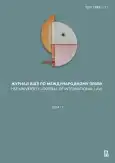A Commentary on the Judgment of the International Court of Justice of 31 January 2024 in Application of the ICSFT and CERD (Ukraine v. Russian Federation)
- Authors: Nalgiev A.M.1,2, Polshakova V.V.1, Gavkalyuk A.B.1
-
Affiliations:
- HSE University
- Ivanyan&Partners
- Issue: Vol 2, No 1 (2024)
- Pages: 88–103
- Section: Commentary
- URL: https://journal-vniispk.ru/2949-5717/article/view/320004
- DOI: https://doi.org/10.17323/jil.2024.21573
- ID: 320004
Cite item
Full Text
Abstract
About the authors
Adam Mukhazhirovich Nalgiev
HSE University; Ivanyan&Partners
Email: amnalgiev@gmail.com
ORCID iD: 0000-0002-0505-0483
Doctoral Student at the Faculty of Law (School of International Law), HSE University; Research Intern, Laboratory of International Justice, HSE University; Associate (international disputes) at IvanyanPartners, Moscow, Russia
Victoria Vladimirovna Polshakova
HSE University
Email: polshakovavv@yandex.ru
ORCID iD: 0009-0008-8121-839X
Research Intern, Laboratory of International Justice, HSE University, Moscow, Russia
Anna Bogdanovna Gavkalyuk
HSE University
Email: abgavkaliuk@edu.hse.ru
ORCID iD: 0009-0005-6908-020X
Research Intern of the Laboratory of International Justice, HSE University, Moscow, Russia
References
- Djajic S. (2008) Victims and Promise of Remedies: International Law Fairytale Gone Bad. San Diego International Law Journal, vol. 9, pp. 329–366.
- Fasoli E. (2008) Declaratory Judgments and Official Apologies as Forms of Reparation for the Non-Material Damage Suffered by the State: the Djibouti-France Case. The Law & Practice of International Courts and Tribunals, vol. 7, no. 2, pp. 177–192. DOI:https://doi.org/10.1163/157180308x373086
- Kolb R. (2013) The International Court of Justice. Hart Publishing. DOI:https://doi.org/10.5040/9781509922109
- Palchetti P. (2019) Making and Enforcing Procedural Law at the International Court of Justice. Questions of International Law, vol. 61, pp. 5–20.
- Stein A. (2005) Allocation of the Risk of Error in Civil Litigation, Foundations of Evidence Law. Oxford University Press. DOI:https://doi.org/10.1093/acprof:oso/9780198257363.003.0007
- Stirner T. (2021) The Procedural Law Governing Facts and Evidence in International Human Rights Proceedings. Brill Nijhoff. DOI:https://doi.org/10.1163/9789004463134
- Stoica V. (2021) Remedies before the International Court of Justice: A Systemic Analysis. Cambridge University Press. DOI:https://doi.org/10.1017/9781108855006
- Tsatsos A. (2009) Burden of Proof in Investment Treaty Arbitration: Shifting? Humboldt Forum Recht, pp. 91–104.
Supplementary files








